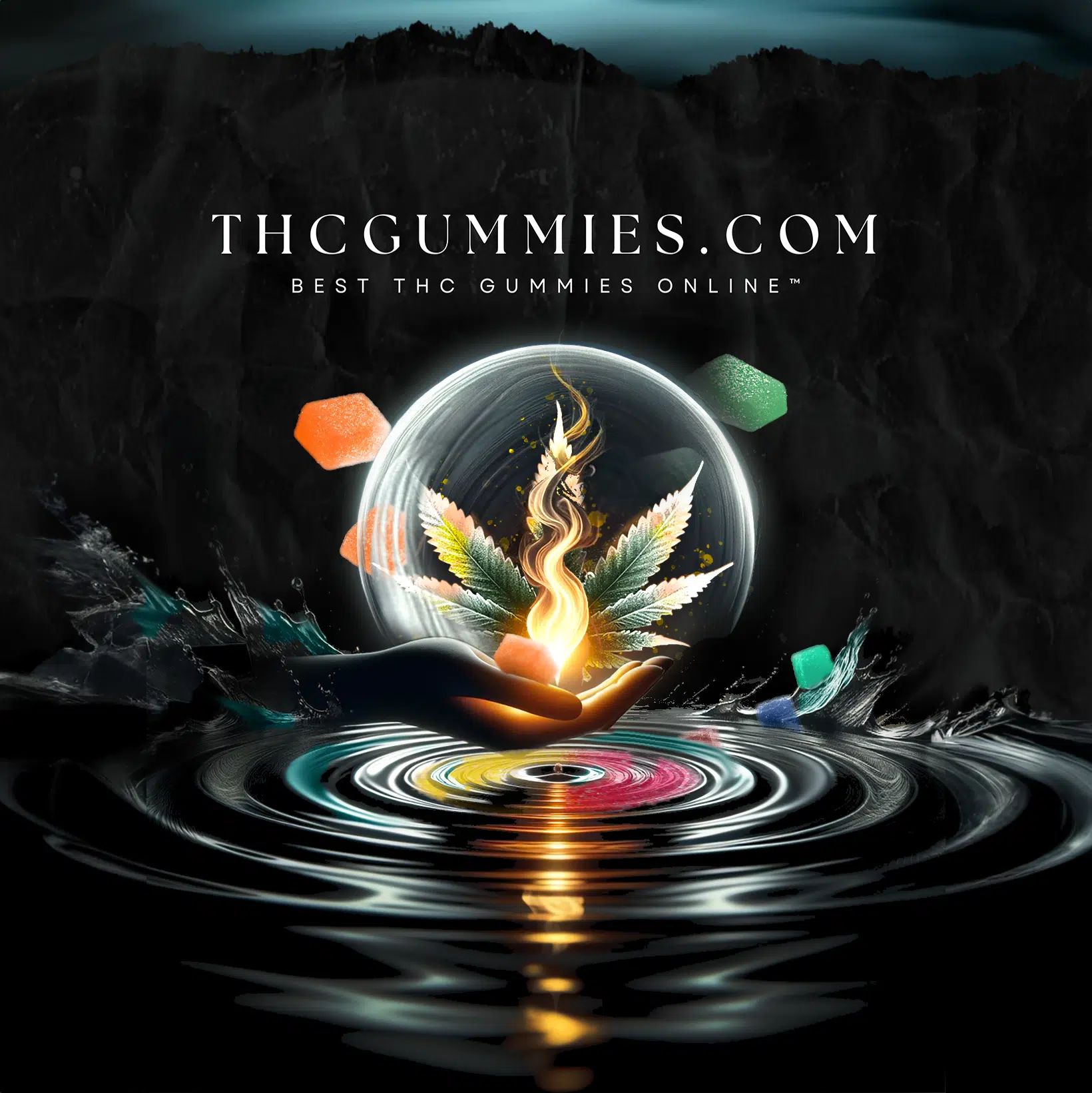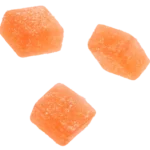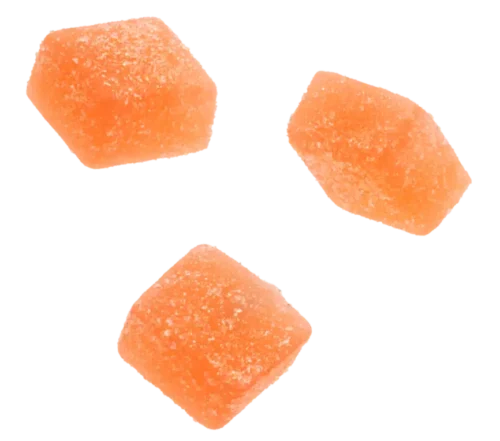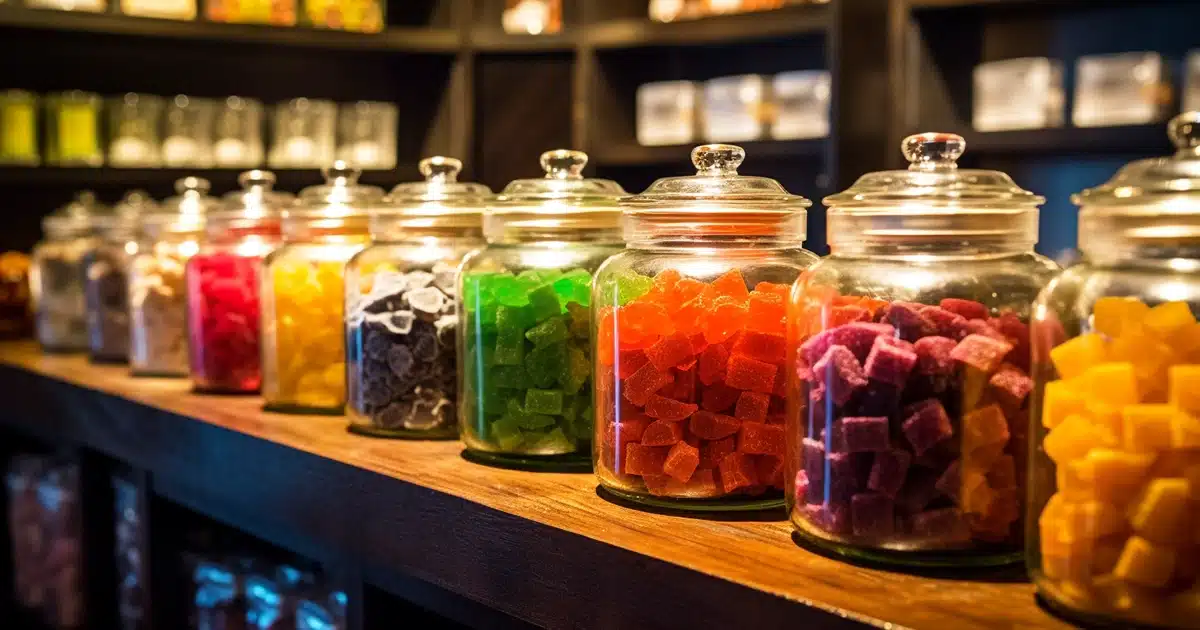Do Edibles Make Your Mouth Dry? Cottonmouth Explained


Christopher Visser
Multi-Cannabis Business Owner
Christopher Visser, the Founder and CEO of Cannabidiol Life and THCGummies.com, is a distinguished figure in the CBD industry, recognized for his pioneering contributions since 2016. With over 120 published articles, Christopher has become a reputable cannabis researcher, writer, and author. He's built two prosperous cannabis ventures that collectively generated millions in annual sales. His in-depth analysis of numerous cannabis studies, collaboration with medical professionals, and personal engagement with thousands of customers underline his expertise and commitment to advancing cannabis understanding daily.
-
 Written By:
Christopher Visser
Written By:
Christopher Visser
- Published:
- Updated: February 8, 2024
- Too Quiet, Light Up The Convo!
Ever wondered why your mouth feels dry after enjoying your favorite THC gummy? Let's dive into the science behind cottonmouth, explore its symptoms, and, most importantly, how you can effectively prevent and manage this side effect. Keep your mouth happy and your THC experience elevated!
Table of Contents
- Tags: Common, Short-Term
We’ve all been there – enjoying the euphoric high of a pot brownie or THC gummy, only to be left with an uncomfortable feeling resembling cotton balls stuffed inside our mouths.
No need to fret, its a common THC users experience, but did you know that if left unmanaged, it can lead to oral health issues?
Key Points
- THC gummies and other edibles can lead to cottonmouth.
- Dry mouth/cottonmouth is a common side effect associated with consuming edibles.
- Cottonmouth is caused from THC interacts with cannabinoids within your ECS.
- Hydration, oral care products, and lifestyle changes are key for preventing & managing dry mouth.
- Proactive prevention helps reduce risks associated with cottonmouth.
What Are Edibles?
Edibles are short for THC edibles, which are ingestible cannabis products infused with THC, a chemical compound found in the cannabis plant that causes euphoric and psychoactive effects.
Edibles come in a variety of flavors, sizes, and types. THC gummies are the most popular form of edibles infused with marijuana or hemp extracts. Users can experience a range of psychotropic effects from consuming THC gummies, such as relaxation, euphoria, increased appetite, and sleepiness.
While THC gummies may offer numerous health benefits, their consumption can lead to cottonmouth, which, if not properly managed, may result in oral health issues.
What Is Cottonmouth?
Cottonmouth is a side effect caused by decreased saliva production from salivary glands. Cottonmouth, is also known as “dry mouth” or scientifically, “xerostomia.” Cotton mouth occurs naturally when you’re nervous or dehydrated, but cottonmouth is more commonly attributed as a side effect from consuming certain drinks fruit juices, foods, substances, or pharmaceutical drugs and medications; especially Tetrahydrocannabinol (THC).
What Cotton Mouth Feels Like
It feels like cotton balls stuffed in your mouth, making your mouth feel stickier than a kid’s fingers after a lollipop, or it could feel as dry as the Sahara desert.
Either way, not a fun experience.
Understanding the science behind cottonmouth and the role of the endocannabinoid system is crucial in managing this side effect and maintaining good oral health.
How Edibles Cause Cottonmouth
To cater to all readers, I decided to offer this explanation in the following three forms:
- Short Answer
- Explanation in Story Form
- Scientific Verbiage Form
Short Answer
When you eat THC gummies, the THC gets into your blood and binds to certain sites on your saliva glands. These sites usually take orders from the brain, like “make more saliva.” But when THC binds to these sites, saliva glands can’t get these messages, leading to decreased saliva output and production.
Explanation In Story Form
Think of your body as a bustling city, run by the mayor, known scientifically as the “Endocannabinoid System” (ECS). This mayor oversees various departments in the city, each responsible for a different biological function, like keeping your mouth nicely hydrated with saliva.
To get things done, the ECS mayor has a team of managers: the cannabinoid receptors. The ones we’re interested in are the CB1 receptors as they impact the saliva department, telling your salivary glands when to whip up a batch of saliva.
So what happens when you consume cannabis edibles?
THC enters your body and gets into your bloodstream, kind of like a new visitor in your city. This visitor has a special VIP pass that lets it chat with the CB1 managers in the saliva department. When THC arrives, it has an impact on these receptors.
The result?
Less saliva production and, bingo – you’re dealing with cottonmouth!
Explained Using Scientific Verbiage
THC, the active component in cannabis, has a significant influence on the parasympathetic nervous system. This part of our autonomic nervous system has a hand in managing involuntary bodily functions like heart rate, digestion, and breathing. THC interfaces with this system by latching onto cannabinoid receptors – primarily the CB1 receptors, which are found throughout our central and peripheral nervous systems.
Research highlights that THC has a two-pronged effect: it stimulates the sympathetic nervous system (which handles our “fight or flight” response) and inhibits the parasympathetic nervous system (responsible for our “rest and digest” state).
For instance, a study involving rabbits discovered that cannabinoids, including THC, can limit both the sympathetic and the vagal nerve signals to the heart by triggering the CB1 receptors.This evidence points towards THC’s ability to suppress the activity of the parasympathetic nervous system.
Additionally, THC has demonstrated its influence on an enzyme named acetylcholinesterase, a vital participant in both the sympathetic and parasympathetic functions. This enzyme carries neural messages by breaking down a neurotransmitter called acetylcholine at what’s called cholinergic synapses, playing an essential role in learning and memory processes.
To sum it up, THC’s impact on the parasympathetic nervous system is quite notable, achieved by suppressing its activity and interacting with the acetylcholinesterase enzyme. This can lead to changes in heart rate, blood pressure, and other functions controlled by the autonomic nervous system.
Still, it’s crucial to remember that the effects of THC on the parasympathetic nervous system can vary significantly. Factors such as dosage, individual physiological differences, and the presence of other cannabinoids can all influence the outcome.
Important Information & Advice
It’s worth noting that cottonmouth isn’t only caused by edibles. It can also happen to you from smoking weed, if you take certain medications, or if you undergo treatments like chemotherapy.
Whether you’re vaping, smoking, or eating THC goodies, for fun or for health benefits, it’s vital to understand the potential side effects of edibles. Knowing what might happen ensures you won’t be taken by surprise.
If you start to experience mouth dryness, it’s important to recognize the signs. Understanding the potential health issues that may come if it’s left unchecked can help you take the right steps to manage it.
Research Studies On The ECS, Cannabinoids, & Salivary Glands
Back in 2006, a researcher named Juan Pablo Prestifilippo and his team at an Argentinian research center decided to dig into why this happens. They focused on whether our salivary glands (which make saliva) have special docking spots, known as cannabinoid receptors, that could be causing this dry mouth feeling.
Their guinea pigs were male rats, and they found that these receptors, called CB1 and CB2, were indeed in specific spots in the submandibular gland – one of the saliva-making glands in rats. They noticed that a compound called anandamide sticks to these receptors and causes hyposalivation (that’s a fancy term for less saliva production).
Meanwhile, Olga Kopach and Juliana Vats from a molecular biology lab in Kiev found something else. Normally, our salivary gland cells use the endocannabinoid system (a biological system in our body) to control saliva buildup in the mouth. But when a person consumes cannabinoids (compounds like THC), these CB1 and CB2 receptors cause a significant drop in saliva production, leading to a dry mouth.
Interestingly, they found that these receptors do different jobs: CB1 mainly controls saliva flow, while CB2 influences the content of saliva, like its sodium levels. Plus, they found that our salivary gland cells can create their own anandamide.
One important note: while cannabis can make your mouth feel like a desert, it doesn’t dehydrate the rest of your body, so it won’t leave you with a hangover like alcohol does, but edible hangovers aren’t ruled out either.
And even more interestingly, these findings about how cannabinoids and salivary glands interact could open new doors to treatments for people having problems with saliva production.
Cottonmouth Symptoms
Common indications of cottonmouth can include any of the following:
- dry sensation in the mouth
- a tacky feeling
- halitosis
- recurrent thirst
- lesions in the mouth
- difficulty with chewing, swallowing, or speaking
- difficulty to taste food
- feeling parched
- hoarseness
- sore throat
- tingling sensation in the oral cavity
- raw or inflamed tongue
When left unmanaged, these symptoms can lead to more severe oral health issues.
Chronic Cottonmouth
Persistent dry mouth from habitual marijuana and cannabis use can lead to oral health complications such as
- tooth decay
- severely cracked lips
- mouth sores
- cavities
- periodontal disease
Understanding the list of symptoms and complications of cottonmouth is essential to be proactive in managing dry mouth symptoms to maintain good oral health.
Strategies for Preventing Dry Mouth
To prevent dry mouth from THC gummies, several strategies can be employed, including maintaining hydration, using oral care products, and making dietary adjustments.
By incorporating these methods into your routine, you can effectively manage dry mouth symptoms and maintain good oral health. Understanding how to prevent dry mouth is crucial, as it allows you to proactively address this side effect before it becomes a more significant issue.
In the following subsections, we’ll explore various strategies for preventing dry mouth, including hydration tips, oral care products, and dietary adjustments.
Hydration Tips
Hydration plays a key role in preventing dry mouth. Staying adequately hydrated helps maintain a moist oral environment and prevents saliva evaporation. To maintain hydration, it’s essential to drink plenty of water throughout the day, especially before and during cannabis consumption.
Additionally, using a straw can assist in maintaining hydration by directing water toward the back of the throat, minimizing contact with the oral cavity. It’s also important to limit the consumption of caffeine and alcohol, as they can exacerbate dry mouth symptoms.
By staying hydrated and avoiding substances that can worsen dry mouth, you can effectively prevent this uncomfortable sensation and maintain good oral health.
Oral Care Products
A variety of oral care products are available for preventing dry mouth. These include
- mouthwash
- toothpaste
- lozenges
- moisturizing oral sprays and gels
- saliva-producing gum and mints
Popular brands such as Biotene, ACT Total Care, Xyli-Melt, and Salese provide products specifically designed to address dry mouth symptoms.
While these oral care products can be effective in preventing dry mouth, be mindful of potential side effects, such as mild irritation or burning sensations in the mouth. Always read the product label and follow the instructions carefully to ensure their safe and effective use.
Dietary Adjustments
Dietary adjustments can play an essential role in preventing dry mouth. Consuming cool, bland foods like yogurt, applesauce, oatmeal, mashed potatoes, and ice cream can help alleviate dry mouth symptoms.
Soft, moist foods such as cooked vegetables, cooked grains, and soft fruits like bananas and peaches can also be beneficial. It’s crucial to avoid alcohol, hot, spicy, and acidic foods, as they can exacerbate dry mouth symptoms.
Sialogogues & Why They’re Important For Cotton Mouth
A sialagogue is a substance that stimulates the salivary glands and promotes the production of saliva, which would help alleviate symptoms of dry mouth.
Mother Nature produces several natural sialogogues, many of which are commonly used in our diets.
Five Examples of Natural Sialogogues:
-
Citrus fruits: Fruits like lemons, oranges, and grapefruits are high in citric acid, which stimulates saliva production.
-
Sour candies or lozenges: Sour candies can trigger the production of saliva. However, be aware that candies and lozenges often contain sugar which can contribute to tooth decay, so opt for sugar-free versions when possible.
-
Spicy foods: Foods with strong spices, like cayenne pepper or chili, can also stimulate saliva production.
-
Herbs and spices: Certain herbs and spices such as fennel, anise, and cardamom are known to stimulate saliva production. They can be consumed in teas or used as seasonings in cooking.
-
Ginger: Ginger is a known natural sialagogue and can help stimulate the production of saliva. It can be consumed in various forms like ginger tea, ginger candies, or in foods.
Remember to always stay well hydrated as water intake is essential in maintaining healthy salivary flow. Furthermore, avoid substances that can dehydrate the body, like alcohol and caffeine, if dry mouth symptoms persist.
As always, it’s advisable to seek medical advice if you’re experiencing persistent dry mouth as it can be a symptom of other underlying health conditions.
Managing Dry Mouth Symptoms
While prevention is essential, it’s also important to have strategies in place for managing dry mouth symptoms when they do occur. In the following subsections, we’ll discuss:
- Immediate relief options
- Long-term management strategies
- When to seek professional help
Immediate Relief Options
For immediate relief from dry mouth symptoms, options such as:
- drink water
- suck on ice cubes
- suck on hard candy
- chew gum (sugar-free)
- drink an herbal tea like green tea
While these immediate relief options can help alleviate dry mouth discomfort and stimulate saliva secretion, they are not a long-term solutions to managing cottonmouth symptoms or the underlying causes.
For long-term management, it’s essential to adopt strategies that address the root causes of cottonmouth, such as maintaining hydration and using oral care products.
Long-term Management Strategies
Long-term management strategies for dry mouth focus on addressing the underlying causes of this side effect. This includes avoiding medications that can cause dehydration, such as antihistamines and decongestants, and using hydrating mouthwashes and breath sprays.
Maintaining a consistent oral hygiene routine and visiting your dentist regularly can also help manage dry mouth symptoms in the long term. By adopting these long-term management strategies, you can effectively address dry mouth symptoms and maintain good oral health.
It’s important to be proactive in managing dry mouth, as persistent cotton mouth symptoms can lead to more severe oral health issues if left untreated.
When to Seek Help From Oral Health Care Providers
If home remedies and prevention strategies are unsuccessful in alleviating dry mouth symptoms, it’s advisable to seek professional help.
A doctor or dentist can diagnose the underlying cause of dry mouth and provide additional treatment options. It’s particularly important to consult a healthcare professional if dry mouth is accompanied by other symptoms, such as sore throat, difficulty swallowing, or bad breath.
By seeking professional help when necessary, you can ensure that your dry mouth symptoms are effectively managed and that your oral health remains in top shape.
Potential Health Concerns Related to Dry Mouth
As discussed throughout this blog post, cottonmouth can lead to various oral health and digestive issues if left unmanaged. The inability to produce saliva causing decreased saliva levels may increase the risk of tooth decay, cavities, periodontal disease, and even tooth loss.
Additionally, the following digestive disturbances may arise from chronic cottonmouth:
- acid reflux
- dysphagia
- abdominal discomfort
By addressing dry mouth proactively, you can maintain good oral health and avoid the potential health issues associated with this side effect.
Dental Health Risks
A dry mouth can pose significant risks to your dental health. Saliva plays a crucial role in maintaining oral health by neutralizing acids produced by bacteria in the mouth, controlling bacterial growth, and removing food particles.
When saliva production is reduced due to dry mouth, your teeth and gums become more susceptible to decay, cavities, and periodontal disease. Recognizing the dental health risks associated with dry mouth is crucial for maintaining good oral health.
By adopting prevention and management strategies, you can effectively address dry mouth symptoms and minimize the potential risks to your dental health.
Digestive Issues
A dry mouth can also have a significant impact on your digestive health. As saliva production decreases, your ability to properly chew and swallow food may be affected.
This can lead to digestive issues such as acid reflux, dysphagia (difficulty swallowing), and dyspepsia (indigestion). By addressing dry mouth symptoms and maintaining good oral health, you can minimize the risk of these digestive issues and support your overall health and well-being.
Importance of Prevention
Prevention is essential to avert the health risks associated with dry mouth. Consuming water, using a humidifier, and chewing sugar-free gum or sucking on sugar-free hard candies can assist in preventing dry mouth.
On top of that, reducing or eliminating the consumption of caffeine, alcohol, and tobacco products can help reduce the risk of dry mouth.
By being proactive and implementing these prevention strategies, you can effectively manage dry mouth symptoms and maintain good oral health, avoiding the potential health concerns associated with this side effect.
FAQ (Frequently Asked Questions)
Does Consuming THC Edibles Result in Cottonmouth?
Yes, THC edibles can cause cottonmouth. THC, the active ingredient in cannabis, has been known to interfere with the salivary gland’s normal functioning, reducing the production of saliva and causing the condition known as “cottonmouth” or dry mouth.
Does Consuming CBD Edibles Lead to a Dry Mouth?
Yes, consuming CBD edibles can cause a dry mouth. CBD can sometimes lead to side effects such as dry mouth, reduced appetite, drowsiness, and fatigue. It’s important to note that CBD may interact with other medications, which can exacerbate these effects. Quality control of CBD products can also be an issue, leading to variations in dosage and effects.
How Can One Quickly Alleviate Dry Mouth?
Quick relief for dry mouth can be achieved by drinking water, sucking on ice cubes, or chewing sugar-free gum. Alternatively, drinking herbal teas, such as green tea, can also help. These methods stimulate saliva production, which helps to combat dry mouth.
Can Edibles Lead to Breathing Difficulties?
Although unlikely, consuming excessive amounts of edibles can lead to uncomfortable symptoms, including breathing difficulties. If severe symptoms like panic attacks, rapid heart rate, or difficulty breathing occur after consuming edibles, it’s crucial to seek immediate medical attention.
Are Edibles More Effective When Placed Under the Tongue?
Yes, certain edibles can be more effective when placed under the tongue. This is particularly true for water-soluble THC and CBD products, as they can be quickly absorbed through the mucosal membrane under the tongue. This method of administration can provide faster effects compared to traditional edibles that need to be digested.
How Can One Alleviate Dry Mouth Caused by Edibles?
Dry mouth caused by edibles can be alleviated by drinking plenty of water, chewing sugar-free gum, or sucking on sugar-free candy. These actions stimulate saliva production, thus reducing the feeling of dry mouth. Staying well-hydrated before consuming edibles can also help prevent cottonmouth.
How Can Dry Mouth from CBD Be Alleviated?
Dry mouth from CBD can be alleviated by drinking plenty of water and chewing sugar-free gum. These actions stimulate saliva production and combat the dry mouth effect. It’s important to remember that this is a common side effect of CBD use and is typically temporary.
What Are the Causes of Dry Mouth?
Dry mouth can be caused by a variety of factors including certain medications, the use of THC, and certain diseases. Medications for conditions like high blood pressure, depression, and bladder control issues often cause dry mouth. Diseases such as Sjögren’s syndrome, HIV/AIDS, and diabetes can also lead to dry mouth. Additionally, lifestyle habits like snoring or mouth-breathing can contribute to this condition.
Can Dry Mouth from Edibles Be Resolved?
Yes, dry mouth from edibles can be managed, but it may not be an overnight process. If the dry mouth is the result of an underlying health condition or a side effect of certain treatments, it may persist for a while. However, lifestyle adjustments and home remedies can help alleviate the discomfort.
How Can the Effects of Cottonmouth from Edibles Be Reduced?
Cottonmouth from edibles can be reduced by staying hydrated, chewing sugar-free gum, and sucking on sugar-free candies. These actions stimulate the salivary glands and help maintain moisture in the mouth. It’s also a good idea to limit the consumption of substances that exacerbate dry mouth, such as caffeine, alcohol, and tobacco.
Summary
In conclusion, it’s crucial to recognize that while THC-infused edibles like gummies can offer numerous benefits, they can also lead to cottonmouth, a discomforting condition resulting from decreased saliva production.
Understanding how THC interacts with your body, specifically your endocannabinoid system, is a key part of managing this side effect. While there are immediate relief options for cottonmouth, adopting long-term strategies—like maintaining hydration, using oral care products, and making dietary adjustments—are vital for effectively managing dry mouth and safeguarding your oral and digestive health.
Don’t forget, if symptoms persist, seeking professional help is recommended.
Have you ever experienced cottonmouth after consuming edibles?
If so, how did you manage it?
Let me know in the comments section below!

If this article sparked a new insight, pass the flame…
LET’S IGNITE RIPPLES OF CANNABIS WISDOM.
Be the catalyst for someone’s breakthrough moment.
SHARE ON SOCIAL MEDIA

YOUR CANNABIS EDIBLE
JOURNEY CONTINUES:
Looking For Something Else?














